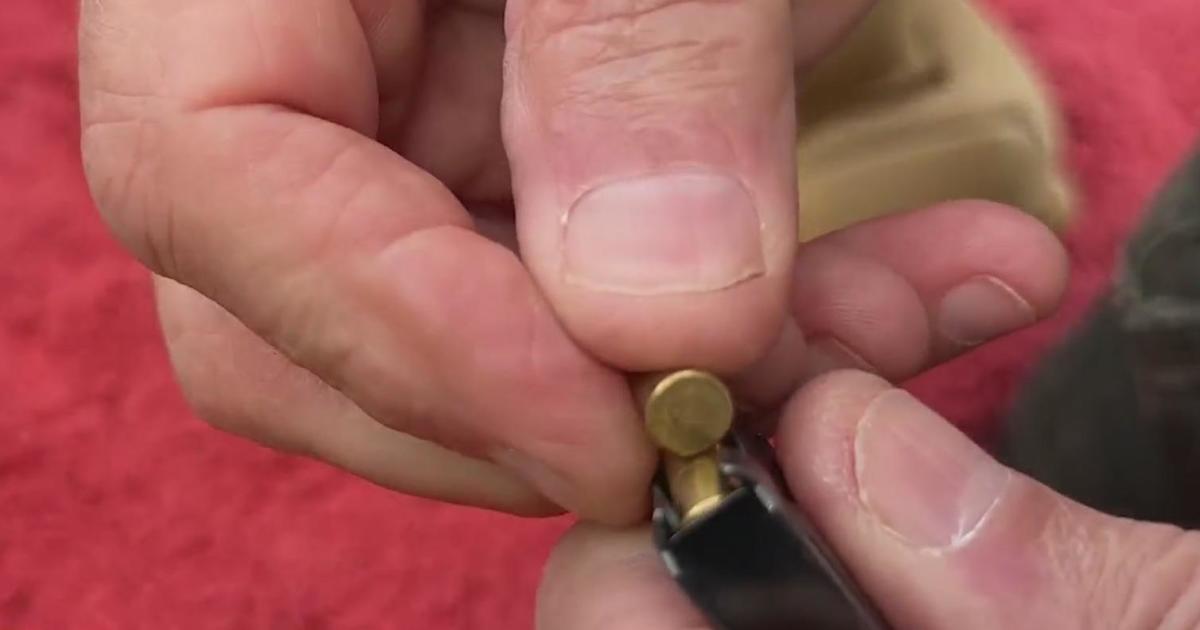California
Experts expect California’s background checks for ammunition law to go to US Supreme Court

The battle over gun and ammunition regulation in California is escalating.
Gun violence prevention advocates say it’s saving lives, while gun rights supporters argue it’s regulation overkill.
Experts expect the case that is challenging state law requiring background checks for purchasing ammunition to go all the way to the U.S. Supreme Court. For Bradley Stolfi, he supports common sense gun regulation.
“I think every firearm should require a background check and it should be thorough,” said Stolfi.
But a state law implemented in 2019 requiring in-person background checks for ammunition isn’t one of them.
“If you ask me if it was something that made shooting difficult, yes it was,” said Stolfi.
Stolfi is using a World War 2 era M-1 carbine for target practice.
“The imposition of needing a background check, and vendors not wanting to send ammunition to California, it became problematic for me to find this ammunition for this rifle with ease,” said Stolfi.
The Cloverdale resident has been buying gun powder and primers to hand load cartridges for many of his rifles since the tighter ammo restrictions were put in place.
“That incurred a substantial cost in all the materials I needed to do it,” said Stolfi.
Many hunters and gun owners say the restrictions violate their 2nd amendment right to bear arms. A federal judge recently agreed, overturning the law.
But days later, the 9th Circuit Court of Appeals in a 2-to-1 vote put a hold on that ruling.
“We have seen a California that is a far safer place today than it was 30 years ago. Background checks work for firearms. Background checks work for ammunition,” said Steve Lindley.
Lindley has a law enforcement background, and now works for Brady United Against Gun Violence.
“We’re not trying to prevent anybody from purchasing a firearm or purchasing ammunition. What we’re trying to do is keeping firearms and ammunition out of the hands of people who are prohibited or are a danger to our communities,” said Lindley.
“There’s a small number of people out there that shouldn’t have access to ammunition, and that’s more of a problem than is being addressed by just making it more difficult to get the ammunition,” said Stolfi.
The stay issued by the Court of Appeals means background checks for ammunition can once again proceed for now.
“Background checks, safe storage, those type of things all compounded together, make a significant difference,” said Lindley.
But Stolfi believes rather than making it more difficult to purchase ammunition, banning high-capacity magazines, would have more of an impact in saving lives.
“I don’t see any need for any magazine to be able to hold more than 10. That’s going to get me in a lot of trouble with guys I know, but that’s what I think,” said Stolfi.
Stolfi is aiming to find that balance between restrictions and gun rights enshrined in the Constitution.
California Attorney General Rob Bonta, a Democrat, posted on X saying the ruling by the court of appeals means the state’s “life-saving ammunition laws will remain in effect as we continue to defend them in court.”
It’s unclear when the case will be heard.
However the Ninth Circuit Court of Appeals rules, legal experts say the case will likely reach the U.S. Supreme Court.

California
California residents flee massive wildfire sparked by burning car

Thousands of Northern California residents were forced to evacuate their homes as a massive wildfire scorched more than 250 square miles. The Park Fire, California’s largest this year, was started by a man who pushed a burning car into a gully.
California
California's billionaire utopia faces a major setback

Silicon Valley’s billionaire-backed plan to turn 60,000 acres into a utopian “city of yesterday” is officially delayed by at least two years. California Forever confirmed on July 22 that its “East Solano Plan” rezoning proposal will not appear on the region’s November election ballot. Instead, the $900 million project will first receive a full, independent environmental impact review while preparing a development agreement with local county supervisors.
Speaking with The New York Times this week, California Democratic state senator John Garamendi said, “The California Forever pipe dream is in a permanent deep freeze.”
First unveiled in August 2023 after years of stealth land purchases just outside San Francisco, organizers bill the 60,000 acre East Solano Plan as a multistep campaign to build “one of the most walkable and sustainable [towns] in the United States.” Concept art on California Forever’s website depicts idyllic pedestrian squares and solar farms, with lofty promises to bring hundreds of thousands of jobs to the area along with “novel methods of design, construction, and governance,” according to a previous profile. Overseen by former Goldman Sachs trader Jan Sramek, California Forever received financial backing from wealthy venture capitalists including LinkedIn’s co-founder Reid Hoffman and Lauren Powell Jobs, billionaire philanthropist and widow of Steve Jobs.
[ California’s billionaire utopia may not be as eco-friendly as advertised.]
But from the start, locals, environmental advocates, and politicians pushed back against the East Solano Plan. By November 2023, news broke that California Forever’s parent company previously sued a group of locals for $510 billion, citing antitrust violations after the defendants refused to sell their land (the locals later agreed to sell for $18,000 per acre). Meanwhile, state representatives voiced security concerns about the proposed city’s proximity to the nearby Travis Air Force Base.
Last month, the accredited Solano Land Trust announced its opposition to the plan, citing what it believed would be a “detrimental impact” to the region’s “water resources, air quality, traffic, farmland, and natural environment.” The land trust also alleged California Forever backers misled the public by describing much of the area as “non-prime farmland” with “low quality soils.” In reality, the Solano Land Trust explained that the “sensitive habitat… home to rare and endangered plants and animals” includes some of the state’s most water-efficient farmland.
In this week’s announcement, Sramek claims a recent poll conducted by California Forever indicated 65 percent of East Solano residents “support development of good paying jobs, more affordable homes, and clean energy,” while noting that “most voters are also asking for a full environmental impact report to be completed first.”
“The idea of building a new community and economic opportunity in eastern Solano seemed impossible on the surface,” Sramek wrote to Popular Science last year. “But after spending a lot of time learning about the community, which I now call home, I became convinced that with thoughtful design, the right long-term patient investors, and strong partnerships… we can create a new community.”
California
Tech Jobs Keep Moving Out of California. Don’t Panic Yet.

It has been a weird four years for California’s technology sector. It boomed early in the Covid-19 pandemic as people in the US and around the world geared up for remote work and directed their spending to online services (games, streaming, spin classes, etc.) they could consume without leaving home. But that rise in remote work, combined with highest-in-the-nation real estate costs, strict pandemic rules and other factors, also led to something of an exodus from the state’s coastal cities, with high-profile departures of tech leaders in 2020 and 2021 and even occasional claims that the San Francisco Bay Area’s reign as global tech capital was ending.
A few high-profile departures are still taking place, with Elon Musk announcing this month that he will be moving the headquarters of two more of his companies — X, the former Twitter, and SpaceX — from California to Texas, where he moved Tesla Inc.’s headquarters in 2021. But there have also been stories of tech leaders returning and San Francisco beginning a resurgence, with the boom in generative artificial intelligence — the biggest story in tech now — very much concentrated around the San Francisco Bay. My fellow Bloomberg Opinion columnist Conor Sen thinks it might even be a good time to buy some slightly marked-down San Francisco real estate.
-

 World1 week ago
World1 week agoOne dead after car crashes into restaurant in Paris
-

 Midwest1 week ago
Midwest1 week agoMichigan rep posts video response to Stephen Colbert's joke about his RNC speech: 'Touché'
-

 News1 week ago
News1 week agoVideo: Young Republicans on Why Their Party Isn’t Reaching Gen Z (And What They Can Do About It)
-

 Movie Reviews1 week ago
Movie Reviews1 week agoMovie Review: A new generation drives into the storm in rousing ‘Twisters’
-

 News1 week ago
News1 week agoIn Milwaukee, Black Voters Struggle to Find a Home With Either Party
-

 Politics1 week ago
Politics1 week agoFox News Politics: The Call is Coming from Inside the House
-

 News1 week ago
News1 week agoVideo: J.D. Vance Accepts Vice-Presidential Nomination
-

 World1 week ago
World1 week agoTrump to take RNC stage for first speech since assassination attempt
















